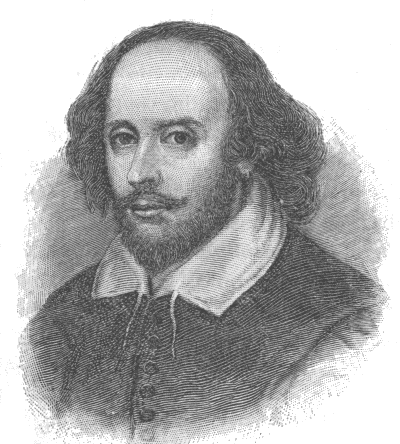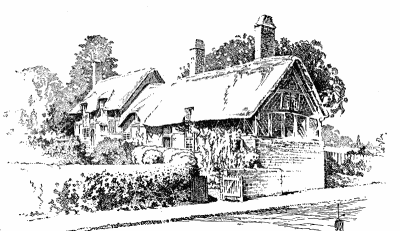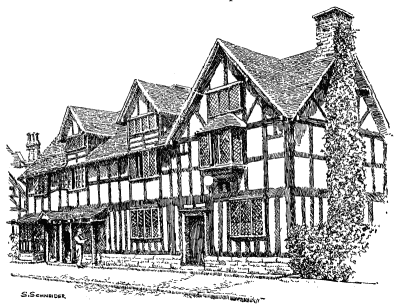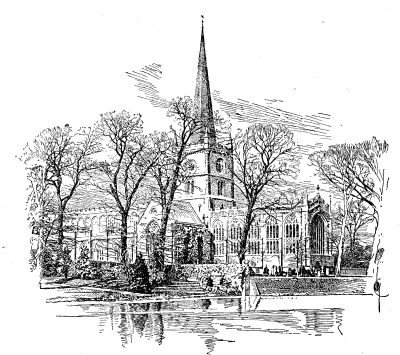One who reads a few of Shakespeare's great plays and then the meager story of his life is generally filled with a vague wonder. Here is an unknown country boy, poor and poorly educated according to the standards of his age, who arrives at the great city of London and goes to work at odd jobs in a theater. In a year or two he is associated with scholars and dramatists, the masters of their age, writing plays of kings and clowns, of gentlemen and heroes and noble women, all of whose lives he seems to know by intimate association. In a few years more he leads all that brilliant group of poets and dramatists who have given undying glory to the Age of Elizabeth. Play after play runs from his pen, mighty dramas of human life and character following one another so rapidly that good work seems impossible; yet they stand the test of time, and their poetry is still unrivaled in any language. For all this great work the author apparently cares little, since he makes no attempt to collect or preserve his writings. A thousand scholars have ever since been busy collecting, identifying, classifying the works which this magnificent workman tossed aside so carelessly when he abandoned the drama and retired to his native village. He has a marvelously imaginative and creative mind; but he invents few, if any, new plots or stories. He simply takes an old play or an old poem, makes it over quickly, and lo! this old familiar material glows with the deepest thoughts and the tenderest feelings that ennoble our humanity; and each new generation of men finds it more wonderful than the last. How did he do it? That is still an unanswered question and the source of our wonder.

WILLIAM SHAKESPEARE
Genius or TrainingThere are, in general, two theories to account for Shakespeare. The romantic school of writers have always held that in him "all came from within"; that his genius was his sufficient guide; and that to the overmastering power of his genius alone we owe all his great works. Practical, unimaginative men, on the other hand, assert that in Shakespeare "all came from without," and that we must study his environment rather than his genius, if we are to understand him. He lived in a play-loving age; he studied the crowds, gave them what they wanted, and simply reflected their own thoughts and feelings. In reflecting the English crowd about him he unconsciously reflected all crowds, which are alike in all ages; hence his continued popularity. And in being guided by public sentiment he was not singular, but followed the plain path that every good dramatist has always followed to success.
Probably the truth of the matter is to be found somewhere between these two extremes. Of his great genius there can be no question; but there are other things to consider. As we have already noticed, Shakespeare was trained, like his fellow workmen, first as an actor, second as a reviser of old plays, and last as an independent dramatist. He worked with other playwrights and learned their secret. Like them, he studied and followed the public taste, and his work indicates at least three stages, from his first somewhat crude experiments to his finished masterpieces. So it would seem that in Shakespeare we have the result of hard work and of orderly human development, quite as much as of transcendent genius.
Life (1564-1616). Two outward influences were powerful in developing the genius of Shakespeare,--the little village of Stratford, center of the most beautiful and romantic district in rural England, and the great city of London, the center of the world's political activity. In one he learned to know the natural man in his natural environment; in the other, the social, the artificial man in the most unnatural of surroundings.
From the register of the little parish church at Stratford-on-Avon we learn that William Shakespeare was baptized there on the twenty-sixth of April, 1564 (old style). As it was customary to baptize children on the third day after birth, the twenty-third of April (May 3, according to our present calendar) is generally accepted as the poet's birthday.
His father, John Shakespeare, was a farmer's son from the neighboring village of Snitterfield, who came to Stratford about 1551, and began to prosper as a trader in corn, meat, leather, and other agricultural products. His mother, Mary Arden, was the daughter of a prosperous farmer, descended from an old Warwickshire family of mixed Anglo-Saxon and Norman blood. In 1559 this married couple sold a piece of land, and the document is signed, "The marke + of John Shacksper. The marke + of Mary Shacksper"; and from this it has been generally inferred that, like the vast majority of their countrymen, neither of the poet's parents could read or write. This was probably true of his mother; but the evidence from Stratford documents now indicates that his father could write, and that he also audited the town accounts; though in attesting documents he sometimes made a mark, leaving his name to be filled in by the one who drew up the document.
Of Shakespeare's education we know little, except that for a few years he probably attended the endowed grammar school at Stratford, where he picked up the "small Latin and less Greek" to which his learned friend Ben Jonson refers. His real teachers, meanwhile, were the men and women and the natural influences which surrounded him. Stratford is a charming little village in beautiful Warwickshire, and near at hand were the Forest of Arden, the old castles of Warwick and Kenilworth, and the old Roman camps and military roads, to appeal powerfully to the boy's lively imagination. Every phase of the natural beauty of this exquisite region is reflected in Shakespeare's poetry; just as his characters reflect the nobility and the littleness, the gossip, vices, emotions, prejudices, and traditions of the people about him.
I saw a smith stand with his hammer, thus,
The whilst his iron did on the anvil cool,
With open mouth swallowing a tailor's news;
Who, with his shears and measure in his hand,
Standing on slippers, which his nimble haste
Had falsely thrust upon contrary feet,
Told of a many thousand warlike French
That were embattailed and ranked in Kent.[145]
Such passages suggest not only genius but also a keen, sympathetic observer, whose eyes see every significant detail. So with the nurse in Romeo and Juliet, whose endless gossip and vulgarity cannot quite hide a kind heart. She is simply the reflection of some forgotten nurse with whom Shakespeare had talked by the wayside.
Not only the gossip but also the dreams, the unconscious poetry that sleeps in the heart of the common people, appeal tremendously to Shakespeare's imagination and are reflected in his greatest plays. Othello tries to tell a curt soldier's story of his love; but the account is like a bit of Mandeville's famous travels, teeming with the fancies that filled men's heads when the great round world was first brought to their attention by daring explorers. Here is a bit of folklore, touched by Shakespeare's exquisite fancy, which shows what one boy listened to before the fire at Halloween:
She comes
In shape no bigger than an agate-stone
On the fore-finger of an alderman,
Drawn with a team of little atomies
Athwart men's noses as they lie asleep;
Her waggon-spokes made of long spinners' legs,
The cover of the wings of grasshoppers,
The traces of the smallest spider's web,
The collars of the moonshine's watery beams,
Her whip of cricket's bone, the lash of film,
Her waggoner a small grey-coated gnat,
Her chariot is an empty hazel nut
Made by the joiner squirrel, or old grub,
Time out o' mind the fairies' coachmakers.
And in this state she gallops night by night
Through lovers' brains, and then they dream of love;
O'er lawyers' fingers, who straight dream on fees,
O'er ladies' lips, who straight on kisses dream.[146]
So with Shakespeare's education at the hands of Nature, which came from keeping his heart as well as his eyes wide open to the beauty of the world. He speaks of a horse, and we know the fine points of a thoroughbred; he mentions the duke's hounds, and we hear them clamoring on a fox trail, their voices matched like bells in the frosty air; he stops for an instant in the sweep of a tragedy to note a flower, a star, a moonlit bank, a hilltop touched by the sunrise, and instantly we know what our own hearts felt but could not quite express when we saw the same thing. Because he notes and remembers every significant thing in the changing panorama of earth and sky, no other writer has ever approached him in the perfect natural setting of his characters.
When Shakespeare was about fourteen years old his father lost his little property and fell into debt, and the boy probably left school to help support the family of younger children. What occupation he followed for the next eight years is a matter of conjecture. From evidence found in his plays, it is alleged with some show of authority that he was a country schoolmaster and a lawyer's clerk, the character of Holofernes, in Love's Labour's Lost, being the warrant for one, and Shakespeare's knowledge of law terms for the other. But if we take such evidence, then Shakespeare must have been a botanist, because of his knowledge of wild flowers; a sailor, because he knows the ropes; a courtier, because of his extraordinary facility in quips and compliments and courtly language; a clown, because none other is so dull and foolish; a king, because Richard and Henry are true to life; a woman, because he has sounded the depths of a woman's feelings; and surely a Roman, because in Coriolanus and Julius Cæsar he has shown us the Roman spirit better than have the Roman writers themselves. He was everything, in his imagination, and it is impossible from a study of his scenes and characters to form a definite opinion as to his early occupation.

ANNE HATHAWAY COTTAGE
In 1582 Shakespeare was married to Anne Hathaway, the daughter of a peasant family of Shottery, who was eight years older than her boy husband. From numerous sarcastic references to marriage made by the characters in his plays, and from the fact that he soon left his wife and family and went to London, it is generally alleged that the marriage was a hasty and unhappy one; but here again the evidence is entirely untrustworthy. In many Miracles as well as in later plays it was customary to depict the seamy side of domestic life for the amusement of the crowd; and Shakespeare may have followed the public taste in this as he did in other things. The references to love and home and quiet joys in Shakespeare's plays are enough, if we take such evidence, to establish firmly the opposite supposition, that his love was a very happy one. And the fact that, after his enormous success in London, he retired to Stratford to live quietly with his wife and daughters, tends to the same conclusion.
About the year 1587 Shakespeare left his family and went to London and joined himself to Burbage's company of players. A persistent tradition says that he had incurred the anger of Sir Thomas Lucy, first by poaching deer in that nobleman's park, and then, when haled before a magistrate, by writing a scurrilous ballad about Sir Thomas, which so aroused the old gentleman's ire that Shakespeare was obliged to flee the country. An old record[147] says that the poet "was much given to all unluckiness in stealing venison and rabbits," the unluckiness probably consisting in getting caught himself, and not in any lack of luck in catching the rabbits. The ridicule heaped upon the Lucy family in Henry IV and the Merry Wives of Windsor gives some weight to this tradition. Nicholas Rowe, who published the first life of Shakespeare,[148] is the authority for this story; but there is some reason to doubt whether, at the time when Shakespeare is said to have poached in the deer park of Sir Thomas Lucy at Charlescote, there were any deer or park at the place referred to. The subject is worthy of some scant attention, if only to show how worthless is the attempt to construct out of rumor the story of a great life which, fortunately perhaps, had no contemporary biographer.
Of his life in London from 1587 to 1611, the period of his greatest literary activity, we know nothing definitely. We can judge only from his plays, and from these it is evident that he entered into the stirring life of England's capital with the same perfect sympathy and understanding that marked him among the plain people of his native Warwickshire. The first authentic reference to him is in 1592, when Greene's[149] bitter attack appeared, showing plainly that Shakespeare had in five years assumed an important position among playwrights. Then appeared the apology of the publishers of Greene's pamphlet, with their tribute to the poet's sterling character, and occasional literary references which show that he was known among his fellows as "the gentle Shakespeare." Ben Jonson says of him: "I loved the man and do honor his memory, on this side idolatry, as much as any. He was indeed honest, and of an open and free nature." To judge from only three of his earliest plays[150] it would seem reasonably evident that in the first five years of his London life he had gained entrance to the society of gentlemen and scholars, had caught their characteristic mannerisms and expressions, and so was ready by knowledge and observation as well as by genius to weave into his dramas the whole stirring life of the English people. The plays themselves, with the testimony of contemporaries and his business success, are strong evidence against the tradition that his life in London was wild and dissolute, like that of the typical actor and playwright of his time.
Shakespeare's first work may well have been that of a general helper, an odd-job man, about the theater; but he soon became an actor, and the records of the old London theaters show that in the next ten years he gained a prominent place, though there is little reason to believe that he was counted among the "stars." Within two years he was at work on plays, and his course here was exactly like that of other playwrights of his time. He worked with other men, and he revised old plays before writing his own, and so gained a practical knowledge of his art. Henry VI (c. 1590-1591) is an example of this tinkering work, in which, however, his native power is unmistakably manifest. The three parts of Henry VI (and Richard III, which belongs with them) are a succession of scenes from English Chronicle history strung together very loosely; and only in the last is there any definite attempt at unity. That he soon fell under Marlowe's influence is evident from the atrocities and bombast of Titus Andronicus and Richard III. The former may have been written by both playwrights in collaboration, or may be one of Marlowe's horrors left unfinished by his early death and brought to an end by Shakespeare. He soon broke away from this apprentice work, and then appeared in rapid succession Love's Labour's Lost, Comedy of Errors, Two Gentlemen of Verona, the first English Chronicle plays,[151] A Midsummer Night's Dream, and Romeo and Juliet. This order is more or less conjectural; but the wide variety of these plays, as well as their unevenness and frequent crudities, marks the first or experimental stage of Shakespeare's work. It is as if the author were trying his power, or more likely trying the temper of his audience. For it must be remembered that to please his audience was probably the ruling motive of Shakespeare, as of the other early dramatists, during the most vigorous and prolific period of his career.

BIRTHPLACE OF SHAKESPEARE
Shakespeare's poems, rather than his dramatic work, mark the beginning of his success. "Venus and Adonis" became immensely popular in London, and its dedication to the Earl of Southampton brought, according to tradition, a substantial money gift, which may have laid the foundation for Shakespeare's business success. He appears to have shrewdly invested his money, and soon became part owner of the Globe and Blackfriars theaters, in which his plays were presented by his own companies. His success and popularity grew amazingly. Within a decade of his unnoticed arrival in London he was one of the most famous actors and literary men in England.
Following his experimental work there came a succession of wonderful plays,--Merchant of Venice, As You Like It, Twelfth Night, Julius Cæsar, Hamlet, Macbeth, Othello, King Lear, Antony and Cleopatra. The great tragedies of this period are associated with a period of gloom and sorrow in the poet's life; but of its cause we have no knowledge. It may have been this unknown sorrow which turned his thoughts back to Stratford and caused, apparently, a dissatisfaction with his work and profession; but the latter is generally attributed to other causes. Actors and playwrights were in his day generally looked upon with suspicion or contempt; and Shakespeare, even in the midst of success, seems to have looked forward to the time when he could retire to Stratford to live the life of a farmer and country gentleman. His own and his father's families were first released from debt; then, in 1597, he bought New Place, the finest house in Stratford, and soon added a tract of farming land to complete his estate. His profession may have prevented his acquiring the title of "gentleman," or he may have only followed a custom of the time[152] when he applied for and obtained a coat of arms for his father, and so indirectly secured the title by inheritance. His home visits grew more and more frequent till, about the year 1611, he left London and retired permanently to Stratford.

TRINITY CHURCH, STRATFORD-ON-AVON
Though still in the prime of life, Shakespeare soon abandoned his dramatic work for the comfortable life of a country gentleman. Of his later plays,Coriolanus, Cymbeline, Winter's Tale, and Pericles show a decided falling off from his previous work, and indicate another period of experimentation; this time not to test his own powers but to catch the fickle humor of the public. As is usually the case with a theater-going people, they soon turned from serious drama to sentimental or more questionable spectacles; and with Fletcher, who worked with Shakespeare and succeeded him as the first playwright of London, the decline of the drama had already begun. In 1609, however, occurred an event which gave Shakespeare his chance for a farewell to the public. An English ship disappeared, and all on board were given up for lost. A year later the sailors returned home, and their arrival created intense excitement. They had been wrecked on the unknown Bermudas, and had lived there for ten months, terrified by mysterious noises which they thought came from spirits and devils. Five different accounts of this fascinating shipwreck were published, and the Bermudas became known as the "Ile of Divels." Shakespeare took this story--which caused as much popular interest as that later shipwreck which gave us Robinson Crusoe--and wove it into The Tempest. In the same year (1611) he probably sold his interest in the Globe and Blackfriars theaters, and his dramatic work was ended. A few plays were probably left unfinished[153] and were turned over to Fletcher and other dramatists.
That Shakespeare thought little of his success and had no idea that his dramas were the greatest that the world ever produced seems evident from the fact that he made no attempt to collect or publish his works, or even to save his manuscripts, which were carelessly left to stage managers of the theaters, and so found their way ultimately to the ragman. After a few years of quiet life, of which we have less record than of hundreds of simple country gentlemen of the time, Shakespeare died on the probable anniversary of his birth, April 23, 1616. He was given a tomb in the chancel of the parish church, not because of his preëminence in literature, but because of his interest in the affairs of a country village. And in the sad irony of fate, the broad stone that covered his tomb--now an object of veneration to the thousands that yearly visit the little church--was inscribed as follows:
Good friend, for Jesus' sake forbeare
To dig the dust enclosed heare;
Bleste be the man that spares these stones,
And curst be he that moves my bones.
This wretched doggerel, over the world's greatest poet, was intended, no doubt, as a warning to some stupid sexton, lest he should empty the grave and give the honored place to some amiable gentleman who had given more tithes to the parish.